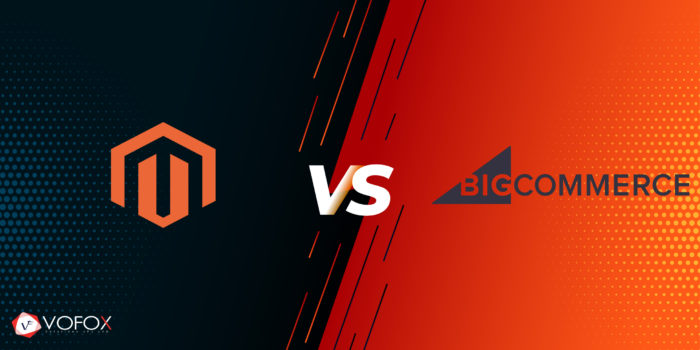- January 08, 2021 8:39 am
- by Sooraj
- January 08, 2021 8:39 am
- by Sooraj

Magento or Bigcommerce? Confused about which eCommerce platform is right for your online store? With tons of info out there on the internet, it can be a really tough decision to make especially for business owners of e-commerce startups.
Both these platforms can meet the requirements of a regular e-commerce store. Both of them enable you to make changes in your online store’s design and functionalities. This includes customization of your online store themes, product pages, etc. While some features and functionalities of these platforms may look similar, both platforms often differ in several ways, they have their own unique set of features and functionalities. Hence, you have to ensure that the platform that you use for building your online store complies with your unique needs. At the end of the day, the important thing your users need is an unmatched shopping experience. In this blog post, we will have an in-depth comparison between Magento and Big commerce so that you can make the right decision for your eCommerce website.
The key difference that separates both eCommerce platforms is the way they are built. Bigcommerce is a Software as a Service (SaaS) platform whereas Magento is an open-source Platform as a Service (PaaS). This is a key difference that directly or indirectly affects the functionality, user experience, and performance of your online store.
Being an open-source framework, Magento gives you total control over your online store’s overall looks and functionalities. You can go with Magento if you want to customize your online store with features that are specific to your business. However, for you to fully take advantage of the customization abilities of Magento, you’ll probably want to Hire Magento developers who have extensive expertise in building feature-packed online stores for customers across the globe.
Bigcommerce on the other hand is pretty much an out-of-the-box solution that gives you freedom from setting up and hosting your e-commerce store. Bigcommerce gives you the added convenience of selecting prebuilt functionalities such as wish lists, advanced payment options, email marketing, loyalty programs, and much more without the need to hire e-commerce developer to build or maintain your website. However, if you have eCommerce developers within your in-house team, Magento is the one you should go for as it gives total control over the overall functionality and design of your online store. If you don’t have experienced developers in your in-house IT team, you can partner up with an E-Commerce website development company to build your online store.
Even though Bigcommerce can come out as a handy e-commerce solution, it may not be as customizable and scalable when compared to Magento. With Magento, you will be able to add a feature that is specific to your business with the ability to add endless customizations.
Another key area that you must look into is your online store’s security. Considering the level of damages that is done to e-commerce websites by malware, it is important for you to choose a platform that offers protection against hacking incidents. Nevertheless, Magento is considered as one of the top e-commerce platforms in terms of security. This is because the developers of Magento release regular security updates and bug fixes. You must also ensure that the eCommerce sellers that you do business with are PCI compliant. This will ensure you safeguard all your customers’ payment information.
Multi-store functionality is another cool feature Magento offers. This feature allows you to build multiple stores in a single installation with multiple URLs for each store. This makes your administrative work hassle-free. Along with this feature, Magento also supports multiple languages, brands, solutions, and currency. This helps you to sell your products to customers almost anywhere in the globe. Moreover, the platform also allows you to customize your online store by integrating custom systems without compromising your backend code.
Both Magento and Bigcommerce have a great marketplace that delivers you the added advantage of limitless customization. From the marketplace, you can find virtually any plugins & extensions that are specific to your online stores such as plugins for running email campaigns, loyalty programs, shipment tracking, and much more. However, when compared to Magnetos marketplace, BigCommerce’s app store has fewer plugins and apps. If you use Magento, Your e-commerce developers should follow a traditional process to install the extensions whereas installing BigCommerce plugins on the other hand can be directly installed from the marketplace as soon as you download them.
The part where most users love Bigcommerce is in the area of maintenance and hosting. Soon after a new release, the software gets updated without the need for you to manually update it. Bug fixing is also similar to this and is done automatically. However, If you are using the free version of Magento, you need to do hosting by yourself and need to rely on your developers for updates, maintenance, and bug fixes. Whereas its paid version is already hosted on AWS.
You must be now curious to know what it cost to build an online store on Magento and Bigcommerce. Let’s start with Magento, the cool thing that most users love about this platform is the availability of an opensource version. As it’s open-source, you can use this version without having to spend a single dime. The platform is initially free if you are just starting out. Since it’s open-source, the Magento community licensing comes at no cost, however, if you want to build an online store that generates millions of dollars in sales per year, it’s better to go with its paid version known as Magento Commerce. This comes at a starting price of $22,000 per year. In both instances, the most notable costs with Magento are from hiring a Magento developer or a Magento Development Company in India to build your eCommerce store as it’s pretty hard to customize your own store without their help. With Bigcommerce on the other hand you have the software and hosting covered for a monthly subscription fee starting at $29.5 per month. You may spend a little extra on a few plugins and still need to hire developers if you want extra customizations beyond your skill level.
Guaranteed Response within One Business Day!

10 Best AI Coding Assistant Tools in 2026 (From a Developer Who's Tried Them All)
What is Infrastructure as Code (IaC)?

Front-End Performance in 2026: What Core Web Vitals Actually Mean for Your Site

What is FinOps?

Micro-Frontends: Breaking Down Monolithic React Applications